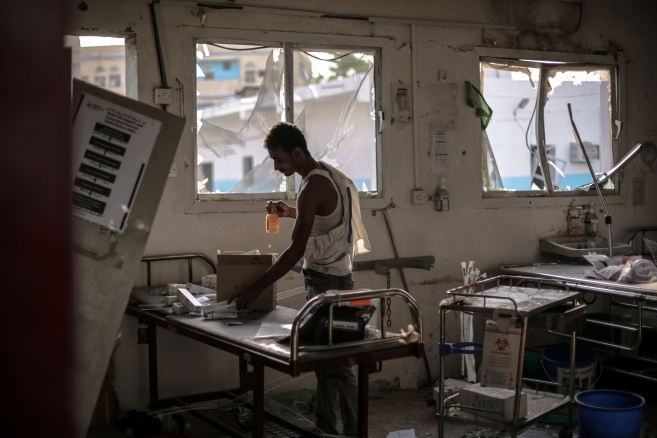
A hospital worker salvages the remains of undamaged medication and equipment left in the emergency room after the 15 August Saudi-led coalition airstrike which destroyed the hospital killing 19. © MSF/Rawan Shaif
This year marks the 20th anniversary of the Security Council’s inclusion of the protection of civilians as an item in its agenda, as well as the 70th anniversary of the Geneva Conventions.
In his report on the protection of civilians this anniversary year, the UN Secretary-General António Guterres again built on previous reports issued over the past decade to highlight the devastating harms caused to civilians when explosive weapons are used in populated areas during conflict.
Quoting data from INEW member Action on Armed Violence that puts civilian casualties of explosive weapons in populated areas at over 20,000 in 2018 and documents an increase of 61% in civilian casualties resulting from the use of air-launched weapons, the report emphasises that the scale of civilian casualties is “both tragic and appalling”.
Drawing on examples from Yemen, Afghanistan, Syria, Nigeria, Iraq and numerous other states to demonstrate that the results of using explosive weapons use in populated areas go beyond deaths and injuries to impacts with long term consequences including the destruction of housing, schools, hospitals, electricity grids, irrigation systems, agricultural sites, and water and sanitation systems. The humanitarian impact of explosive remnants of war left by the use of explosive weapons in populated areas is also discussed, given the lethal threat and obstacles to return and reconstruction that these pose.
Though the Secretary-General welcomed the efforts of some states to minimise civilian casualties and damage to civilian objects through targeting processes, he emphasised that concerns remain, including over the accuracy of intelligence, adequacy of existing collateral damage estimation methodology, and the frequency and detail with which battle damage assessments are carried out.
Guterres notes that he has “repeatedly called on parties to conflict to avoid the use of explosive weapons with wide-area effects in populated areas, owing to the immediate and cumulative, complex and long-term harm resulting from such use”. He also reiterated his support for a declaration on explosive weapons that would see states commit to avoiding the use of explosive weapons with wide-area effect in populated areas and develop operational policies based on a presumption against such use.
This week, on 24 May, states are set to discuss the protection of civilians, and the UN Secretary-General’s recent report on the issue, in a UN Security Council open debate. This provides an opportunity to recognise the urgent humanitarian problem that the use of explosive weapons in populated areas represents, and to express support for a political declaration on protecting civilians from the use of explosive weapons in populated areas as a step towards addressing this issue with concrete commitments and action.
Photo: © MSF/Rawan Shaif
